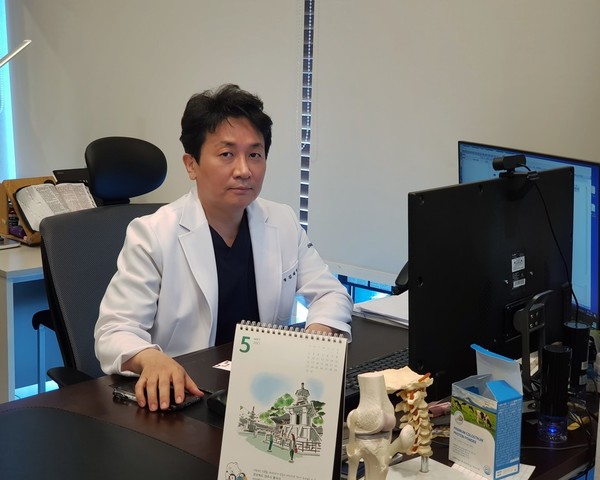New vaccine will generate antibodies easily with fewer side effects: CEO
Various types of Covid-19 vaccines, including mRNA vaccines by Moderna and Pfizer/BioNTech have obtained approval or are being studied actively.
In Korea, companies such as Genexine and GeneOne Life Science are working on covid-19 DNA vaccines.
CK-Exogene is a rare local biotech firm trying out new technology to prevent Covid-19. The company is developing a Covid-19 vaccine using exosomes.
Established in May 2019, CK-Exogene started as a developer of an arthritis treatment using stem cells. However, as the Covid-19 pandemic hit the world in 2020, the company changed the direction of drug development to develop a Covid-19 vaccine using exosomes possibly.
With Jeonbuk National University Hospital, CK-Exogene conducted a pre-clinical trial to confirm the potential of an exosome-based Covid-19 vaccine and registered a related patent.
In April, the vaccine development began in earnest. On April 28, the company signed an MOU for clinical trials and commercialization of the vaccine candidate with Ajou University Medical Center’s Research Institute for Innovative Medicine and G-Bio Lab.
While existing mRNA, virus vector, and protein recombinant Covid-19 vaccines cause unnecessary immune responses such as high fever, muscle pain, and blood clots, an exosome-based Covid-19 vaccine could show a high antibody production rate with fewer side effects, CK-Exogene said.
The development of an exosome-based Covid-19 vaccine is still very rare worldwide.
Korea Biomedical Review has met with CK-Exogene(homepage: www.ckexogene.com) CEO Kim Jae-young, a rehabilitation specialist running Shinwoo Stem Cell Clinic, to learn more about the company’s business plan.

Question: Can you briefly explain what exosomes are?
Answer: Exosomes are nanoparticles with a diameter of 50 to 200 nm that are secreted by cells. They act as carriers that contain “messages” when sending and receiving signals between cells. Exosomes contain various information about the parent cell, such as protein, fat, RNA, and growth factors. So, they are used as diagnostic markers for diseases and are expected to become next-generation drug delivery vehicles thanks to their bio-friendly features.
Q: What made you start developing a Covid-19 vaccine using exosomes?
A: I founded CK-Exogene in May 2019. At the time, we focused on developing a stem cell osteoarthritis treatment. But the more I studied, and the more I read papers, I came to think that exosome-based technology could be a next-generation technology after stem cells. I think exosomes have all the advantages of stem cells. Then, Covid-19 broke out, and I thought exosomes could be used as a vaccine against Covid-19. We have had a plan to develop it since last year, and after preparations such as patent registration, we began the vaccine development the previous month in earnest.
Q: What are the principles and advantages of an exosome-based Covid-19 vaccine?
A: A pre-clinical trial results at Jeonbuk National University Hospital showed that exosomes produced for a Covid-19 vaccine contained three proteins out of the four proteins of the Covid-19 virus (spike, membrane, envelope, and nucleocapsid protein), except for nucleocapsid protein.
If we administer these exosomes into the human body, the body can build antibodies against Covid-19. I hope that only a single shot will secure immunity. As exosomes included three proteins, including Covid-19 virus spike protein as antigens, our vaccine could provide strong immunogenicity against virus variants, too.
Let’s take a look at mRNA vaccines that draw the most attention these days. The vaccine injection should penetrate the cell membrane and enter the cell to produce the spike protein that functions as an antigen. But getting into the cell is not easy. People use lipid nanoparticles (LNP) technology for this purpose. DNA vaccines face more difficulty because they should penetrate not only the cell membrane but the nuclear membrane.
On the other hand, exosomes have the same structure as the cell membrane. So, we expect that the absorption rate will be higher. As exosomes are derived from the human body, their strong safety is an important advantage.
Q: If an exosome-based Covid-19 vaccine is so effective and safe, why aren’t other companies developing it?
A: There are some technological barrios to the commercialization of exosomes. Above all, it isn't easy to mass-produce exosomes. It is difficult to isolate high-purity exosomes but takes a lot of time, which means low productivity. Also, it is even more difficult to produce exosomes that carry desired substances.
But CK-Exogene resolved this issue. We have secured a technology that can mass-produce exosomes 1,000 times or more compared to existing technologies. So far, we have registered two patents and seeking two other patents to develop a Covid-19 vaccine.
Based on this technology, we plan to mass-produce exosomes. The company completed a GMP plant in Seongnam, Gyeonggi Province, in May and is waiting for approval.
Q: What are CK-Exogen’s business strategy and goals?
A: First of all, I want to fight the bias against an exosome-using Covid-19 vaccine. I want to push for more R&D to prove how exosome technology can be useful. Looking further, we hope to license out exosome-based Covid-19 vaccine to a multinational drugmaker in the phase-1 or phase-2 trial stage. We are also preparing an initial public offering in the second half of next year.

